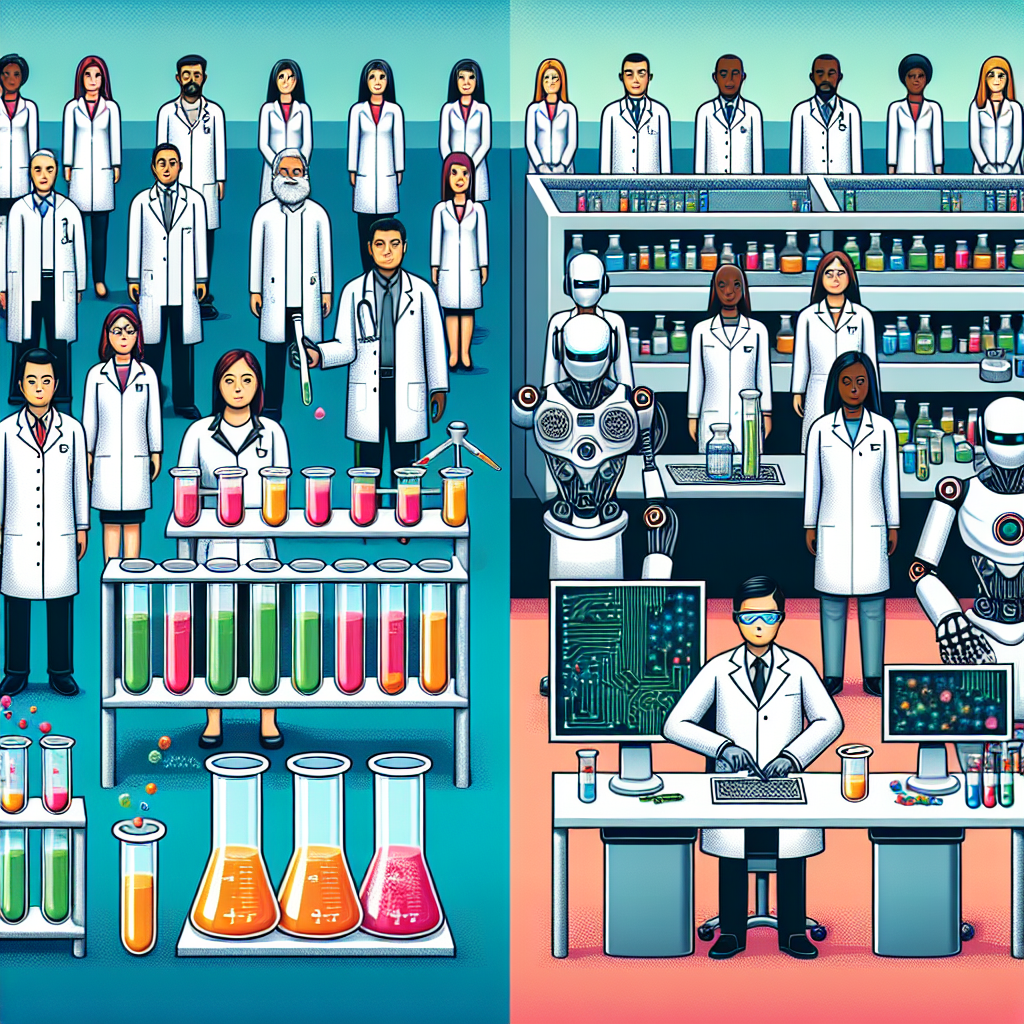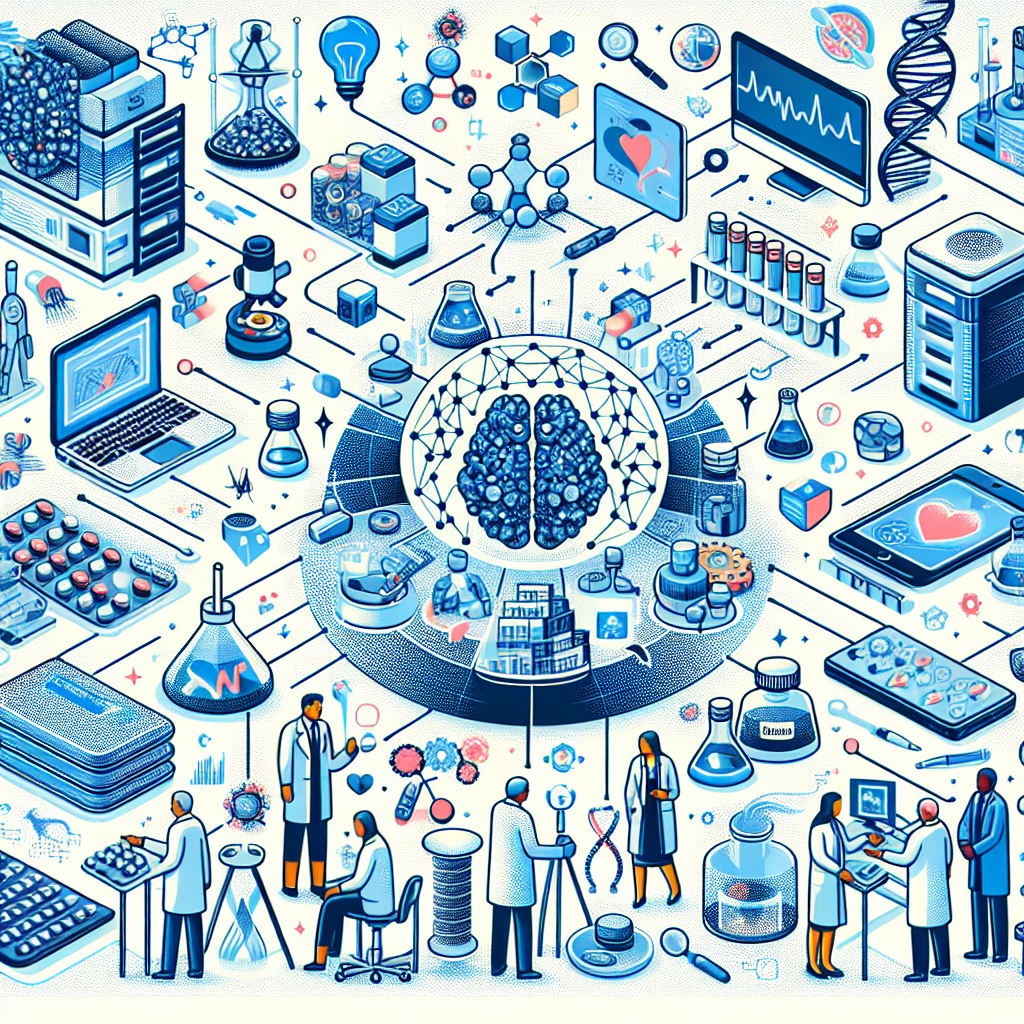How AI is Transforming the Pharma Industry

Discover how AI is revolutionizing the Pharma Industry! Learn about the latest advancements, the impact on drug discovery, and much more. Don’t miss out on this technological revolution. Click here to explore more.
Exploring the Impact of AI on Drug Discovery in the Pharma Industry
Artificial Intelligence (AI) is revolutionizing various sectors, and the pharmaceutical industry is no exception. The advent of AI in the pharma industry is transforming the way drugs are discovered, developed, and distributed. This article explores the profound impact of AI on drug discovery in the pharma industry.
Drug discovery is a complex, time-consuming, and expensive process. It involves identifying target diseases, finding potential drug candidates, testing their efficacy and safety, and finally, getting regulatory approval. Traditionally, this process could take up to 15 years and cost billions of dollars. However, AI is poised to disrupt this traditional model by accelerating the drug discovery process and reducing costs.
AI algorithms can analyze vast amounts of data faster and more accurately than humans. They can sift through millions of chemical structures, identify potential drug candidates, and predict their properties and effects. This ability to process and analyze big data is particularly useful in the initial stages of drug discovery, where potential drug molecules are screened and selected. AI can significantly speed up this process, reducing the time taken from years to months or even weeks.
Moreover, AI can also help in predicting the success of a drug candidate. By analyzing data from previous clinical trials, AI can predict the likelihood of a drug candidate’s success in clinical trials. This predictive capability can help pharmaceutical companies make informed decisions and avoid investing in drug candidates that are likely to fail.
AI is also transforming the way clinical trials are conducted. AI can help in patient recruitment by identifying suitable candidates for clinical trials. It can also monitor patients’ health during the trial and detect any adverse effects early. This can improve the safety and efficiency of clinical trials.
Furthermore, AI can also help in personalizing medicine. By analyzing a patient’s genetic data, AI can predict how a patient will respond to a particular drug. This can help in developing personalized treatment plans, thereby improving patient outcomes.
Despite these benefits, the adoption of AI in drug discovery is not without challenges. One of the main challenges is the lack of standardized and high-quality data. AI algorithms require large amounts of high-quality data to function effectively. However, much of the data in the pharma industry is unstructured and not standardized. This makes it difficult for AI algorithms to process and analyze the data.
Another challenge is the lack of transparency in AI algorithms. Many AI algorithms are “black boxes,” meaning their decision-making process is not transparent. This lack of transparency can make it difficult to trust the predictions made by AI.
Despite these challenges, the potential benefits of AI in drug discovery are too significant to ignore. Many pharmaceutical companies are already investing in AI and are partnering with AI startups to accelerate their drug discovery efforts. As AI technology continues to evolve and improve, its impact on drug discovery is likely to increase.
In conclusion, AI is transforming the drug discovery process in the pharma industry. It is accelerating the process, reducing costs, improving the efficiency of clinical trials, and enabling personalized medicine. Despite the challenges, the future of drug discovery looks promising with the advent of AI. The pharma industry is just beginning to tap into the potential of AI, and the best is yet to come.
The Role of Artificial Intelligence in Streamlining Clinical Trials

Artificial Intelligence (AI) is revolutionizing various sectors, and the pharmaceutical industry is no exception. One of the most significant areas where AI is making a substantial impact is in streamlining clinical trials. Clinical trials are a critical component of the drug development process, and they are notoriously complex, time-consuming, and expensive. However, with the advent of AI, the landscape of clinical trials is undergoing a significant transformation.
AI is playing a pivotal role in enhancing the efficiency and effectiveness of clinical trials. It is doing so by automating various processes, reducing errors, and speeding up the time it takes to bring a drug to market. One of the ways AI is achieving this is through predictive analytics. AI algorithms can analyze vast amounts of data from previous trials and use this information to predict outcomes of future trials. This not only saves time but also reduces the risk of failure, as potential issues can be identified and addressed before they become problematic.
Moreover, AI is also helping in patient recruitment, a process that has traditionally been a significant bottleneck in clinical trials. Identifying and enrolling suitable participants is a challenging task, often leading to delays. However, AI can analyze patient data from various sources, including electronic health records, to identify potential participants who meet the trial’s criteria. This not only speeds up the recruitment process but also ensures a more diverse and representative sample, thereby enhancing the validity of the trial results.
In addition to predictive analytics and patient recruitment, AI is also transforming the way data is collected and analyzed during clinical trials. Traditionally, data collection has been a manual process, prone to errors and inconsistencies. However, AI can automate this process, ensuring more accurate and reliable data. Furthermore, AI can analyze this data in real-time, providing researchers with immediate insights and allowing them to make timely decisions. This not only improves the quality of the trial but also reduces the time it takes to complete it.
AI is also playing a role in monitoring trial participants and ensuring their adherence to the trial protocol. Through wearable devices and mobile apps, AI can track participants’ health status and medication intake in real-time. If any deviations from the protocol are detected, AI can alert the researchers, allowing them to take immediate action. This not only ensures the integrity of the trial but also enhances participant safety.
Lastly, AI is helping in the post-trial phase as well. Once a trial is completed, there is a wealth of data that needs to be analyzed and reported. AI can automate this process, reducing the time it takes to generate the final report. Moreover, AI can also identify patterns and trends in the data that may not be apparent to human researchers, providing valuable insights for future trials.
In conclusion, AI is transforming the way clinical trials are conducted in the pharmaceutical industry. From predictive analytics to patient recruitment, data collection and analysis, participant monitoring, and post-trial reporting, AI is enhancing the efficiency and effectiveness of clinical trials. As AI continues to evolve and mature, its role in streamlining clinical trials is likely to become even more significant, paving the way for faster, more reliable, and more cost-effective drug development.
How AI is Revolutionizing Patient Care in the Pharma Industry
Artificial Intelligence (AI) is rapidly transforming various sectors, and the pharmaceutical industry is no exception. The advent of AI in the pharma industry is revolutionizing patient care, making it more personalized, efficient, and effective. This transformation is not only beneficial for patients but also for healthcare providers and pharmaceutical companies, as it streamlines processes, reduces costs, and improves outcomes.
One of the most significant ways AI is revolutionizing patient care in the pharma industry is through personalized medicine. AI algorithms can analyze a patient’s genetic makeup, lifestyle, and environmental factors to predict their susceptibility to certain diseases. This information can then be used to develop personalized treatment plans that are more likely to be effective and have fewer side effects. For instance, AI can help identify which cancer patients are likely to respond to specific treatments based on their genetic profiles, thereby improving their chances of survival and quality of life.
Moreover, AI is enhancing drug discovery and development, a process that traditionally takes several years and billions of dollars. AI can analyze vast amounts of data to identify potential drug candidates, predict their effectiveness, and anticipate any possible side effects. This not only accelerates the drug discovery process but also reduces the risk of costly failures in later stages of development. Furthermore, AI can help design clinical trials that are more efficient and ethical by identifying the most suitable participants, thereby reducing the time and cost of bringing new drugs to market.
AI is also playing a crucial role in medication management, particularly for patients with chronic conditions who need to take multiple medications. AI-powered apps can remind patients to take their medications, monitor their adherence, and even alert healthcare providers if a patient misses a dose. This can significantly improve medication adherence, which is a major challenge in chronic disease management.
In addition, AI is improving patient monitoring and follow-up care. Wearable devices and smart home technologies can collect real-time data on a patient’s health status, which can be analyzed by AI to detect any anomalies or changes in their condition. This allows for timely intervention and reduces the need for hospital readmissions, thereby improving patient outcomes and reducing healthcare costs.
Furthermore, AI is facilitating better communication between patients and healthcare providers. AI-powered chatbots can answer patients’ queries, provide health advice, and even triage symptoms, thereby reducing the burden on healthcare providers and improving patient satisfaction. These chatbots can also provide personalized health education and support, empowering patients to take charge of their health.
In conclusion, AI is revolutionizing patient care in the pharma industry by enabling personalized medicine, accelerating drug discovery, enhancing medication management, improving patient monitoring, and facilitating better communication. However, the adoption of AI in the pharma industry also raises several challenges, such as data privacy and security, algorithmic bias, and the need for regulatory oversight. Therefore, it is crucial for stakeholders to work together to address these challenges and harness the full potential of AI to improve patient care. Despite these challenges, the benefits of AI in the pharma industry are undeniable, and its impact on patient care is only set to increase in the coming years.